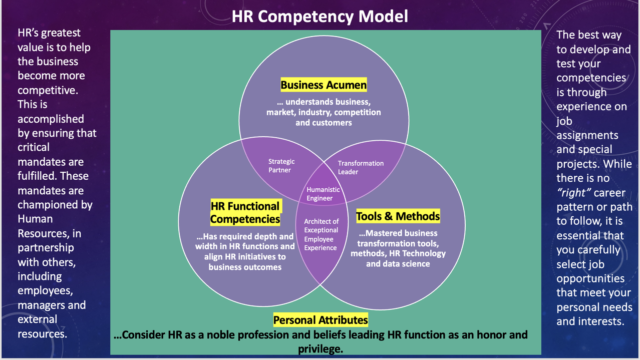
My introduction to the HR competency model occurred during my time at General Electric (GE) in 1999. GE, drawing on Dave Ulrich’s pioneering work, implemented this model to cultivate future HR leaders. This experience profoundly influenced me and has guided my career ever since. In my roles across different organizations and industry sectors, especially in senior HR leadership, I’ve continually applied and refined this model to develop my HR teams.
The Core Value of HR
HR’s primary goal is to enhance business competitiveness. This is achieved by ensuring critical mandates are met, a responsibility that HR shares with employees, managers, and external partners. In my view, HR leaders need to excel in four key areas:
1. Functional Competencies: This involves a comprehensive understanding of HR functions, akin to a “T” model (full-stack HR), with specialized expertise in one or two HR Centers of Excellence (COEs). The HR domain has evolved significantly, transitioning from a welfare and operational focus to a strategic and impactful business role.
2. Business Acumen: Understanding how businesses generate revenue, improve margins, and create long-term value, including total shareholders’ return (TSR), is crucial. This includes insights into the competitive landscape, market operations, industry segments, and consumer/customer dynamics. McKinsey research highlights the importance of focusing on profitability per employee, driven by revenue per employee and cost per employee.
3. Tools and Methods: Staying abreast of leading industry tools and methods is key to effective HR leadership. This includes familiarity with Agile, design thinking, digital technology in HR, data science, Six Sigma, TQM, lean, PCMM, and more. Mastery in these areas distinguishes a skilled HR leader.
4. Personal Attributes and Leadership Qualities: This encompasses judgment, credibility, empathy, compassion, transformative leadership, authenticity, and a belief in the nobility of the HR profession. It also involves a strong sense of purpose and passion, viewing HR leadership as an honor and privilege to impact jobs, careers, and lives.
Expanding the Dave Ulrich Model
As depicted in the diagram below, the intersection of HR domain knowledge and business acumen transforms an HR leader into a strategic partner. The fusion of tools and methods with business acumen positions HR leaders as organization transformation partners. The integration of methods and tools with deep HR domain knowledge drives horizontal integration of HR functions, enhancing employee experiences and positioning HR leaders as employee champions throughout the lifecycle. This approach allows for mass personalization of the employee lifecycle journey, creating customer-grade experiences.
The fourth circle, encompassing the other three, defines an HR leader as a Humanistic Engineer. This role is about understanding each individual in the organization with scientific data, empathy, respect for privacy, and promoting work-life integration. Ultimately, it’s about enabling each individual to bring their whole self to work and celebrate life.
In conclusion, an adept HR leader is a strategic business partner, a transformative enterprise leader, an exceptional creator of employee experiences, and a humanistic engineer. They leverage digital technology, modern methodologies, and data science to unlock human potential and HR’s intangible assets, creating exponential value for employees and the enterprise.
The most effective way to develop and refine your HR competencies involves a multi-faceted approach. It starts with continuous self-assessment, where you evaluate your strengths and areas for improvement. Building a comprehensive development plan is the next critical step, as it provides a structured roadmap for your growth.
Hands-on experience is invaluable. Engaging in on-the-job learning and taking on special projects offer real-world insights and practical skills. Networking with fellow HR practitioners opens doors to new ideas and industry trends, enriching your professional knowledge.
Mentorship plays a vital role too. Being coached by a senior leader provides guidance, wisdom, and a perspective that only experience can bring. Additionally, creating signature experiences — unique, impactful projects or initiatives — helps in solidifying your place in the HR field.
Remember, there is no one-size-fits-all career trajectory in HR. It’s essential to pursue job opportunities that not only align with your career aspirations but also resonate with your personal values and interests. This holistic approach ensures a fulfilling and dynamic career in HR.

